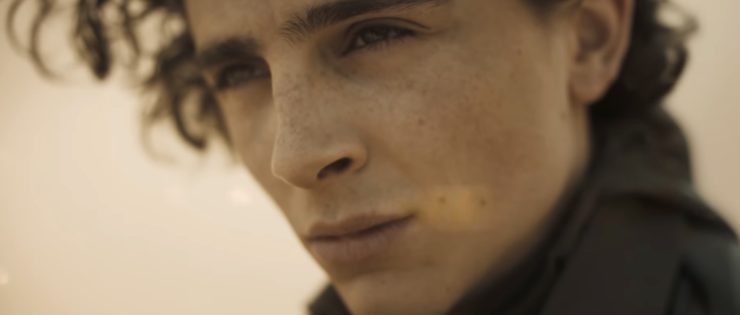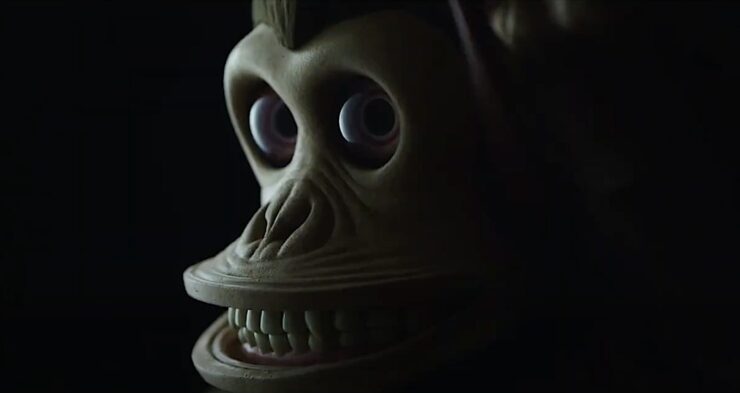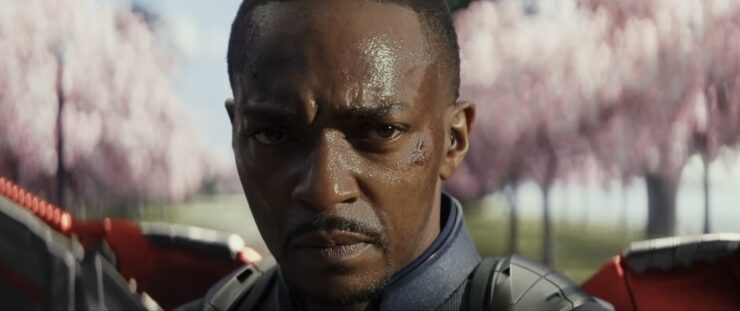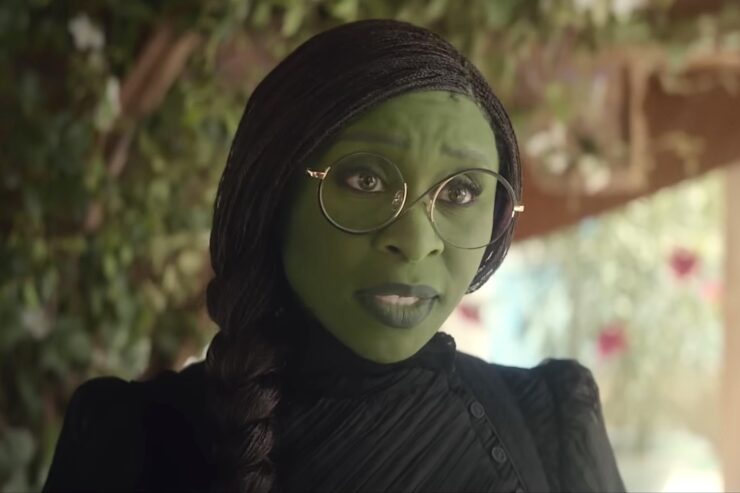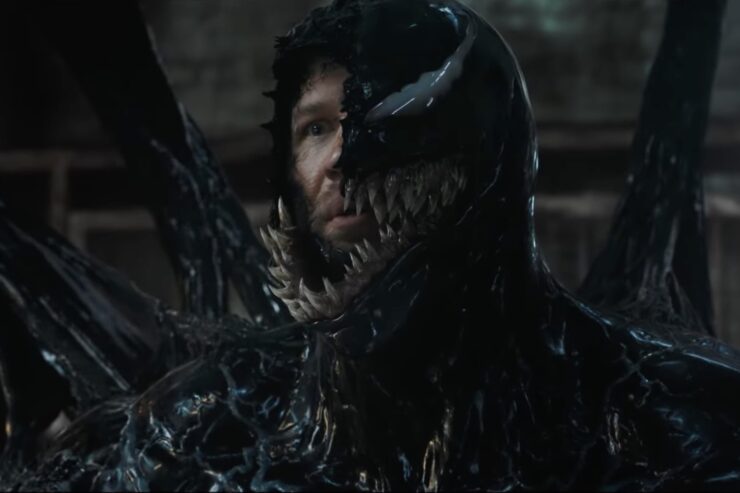The thing about trying to adapt Dune is that Dune has become something of a white whale for filmmaking ever since the book’s release in 1965. Or maybe it’s a dead albatross? A ladder you walked beneath? Point is, it’s difficult and maybe a little cursed, but not because the story of Dune is actually hard to adapt—people just seem to think it is.
What I watched in the theater was definitely Dune (part one, as it says in the opening credits), so director Denis Villeneuve got that part right.
[Spoilers for Dune: Part One]
You know what is kinda hard? Reviewing Dune movies. I’ve done it before, and I’ll probably do it again, and they’re strange beasts to tackle in a critical sense. Everyone wants something different out of book-to-film adaptations. Some want them to hew as closely to the text as possible, some want to see what happens when people free themselves up a bit to find new themes and arcs. I want… both, which is unhelpful. Both with an overlarge side order of acknowledging that films cannot be books, and it’s weird when people want them to be. But I have a lot of thoughts about Dune movies. I appreciate all that is weird and wonderful about David Lynch’s version while still maintaining that it’s a pretty awful thing. I enjoyed the preciousness of how carefully the Sci-Fi miniseries tried to adapt the thing, even when it should have steered clear. I am perfectly content for the fact that we will never see Jodorowsky’s 12-hour marathon.
This version of Dune marks the first time that a director who loved the story Frank Herbert created was given a sizable budget and a decent amount of creative control over the project. Villeneuve has been making moody, sweeping SFF films for a while now, which made him an ideal choice to tackle a project of this scope. In that regard, he does not disappoint in the slightest: this film is beautiful. Freeze upon any number of frames in this movie and prepare to be awed. The marriage of the visuals with the film’s sound engineering is also a feat to behold. Making these aspects sync in any movie is often one of the most difficult aspects of the craft, the place where “flicks” can become “art” in the truest sense, and Dune achieves that. What’s more, it achieves it with the sort of effortlessness that makes the locations seem real and lived in. The film is immaculate in its design, and also very smart about utilizing specific elements to make the world stand out from other science fiction fare; ships modeled after living organisms; “shielded” fight choreography that requires slower and more precise attacks; organic movement embedded into technology. As a viewing experience, Dune is worth every frame.
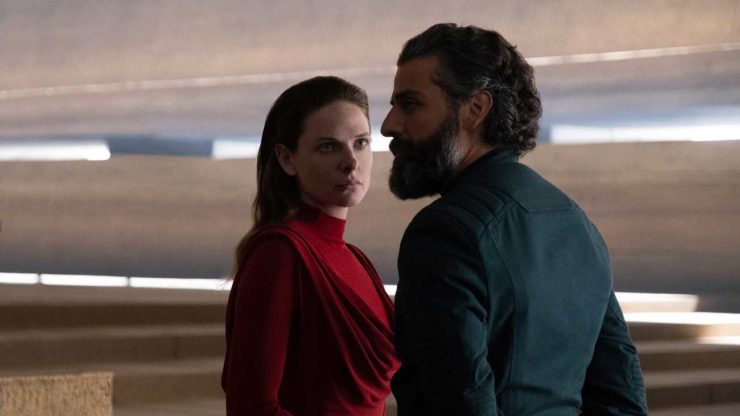
Villeneuve stated in interviews that this is a film he’s wanted to make since childhood, and that love infuses every shot—but so does his love for cinema. Homages to Lawrence of Arabia (the historical account of which Dune is partly based upon) and Apocalypse Now can be found, but also ties to Lynch’s version of Dune and several pointed nods to French filmmaker Luc Besson’s The Fifth Element. These threads make clear that the film knows what narratives and histories it is drawing from, that it bears a certain responsibility in telling a story that falls into the framing of white savior tropes, or any indictment of these issues won’t come off.
Unfortunately, there are many places where those endeavors fall flat. It has been pointed out already that the film has cast no MENA (Middle Eastern and North African) or Indigenous actors in the roles of the Fremen we have seen thus far. This is a sizable oversight considering the Islamic roots of the Fremen as a group, and the peoples they are based upon within the novels (being the Blackfeet Nation, Bedouin, and San people specifically). Additionally, the film engages in colorism (intentionally or not) by killing two of the most prominent characters with dark skin. While Javier Bardem and Zendaya are both a credit to their roles—Stilgar and Chani, for the short time we see them—it smacks of suggesting that people of color are a monolithic group, or perhaps only using the most famous names available to the production.
The Baron Harkonnen is odiously played by Stellan Skargård, but all the eccentricities have been bled out of the character; aside from a Denethor-worthy feasting scene, he reads more like skulking monster of the depths. It’s possible that these changes were enacted to prevent any “queer-coding” of the character; in the books, the Baron’s homosexuality was explicitly tied to his depravity, and his propensity toward lyrical rhyming in dialogue could perhaps be misconstrued in that direction despite its Shakespearean function. Unfortunately, that leaves us with the one aspect of the character that remains unaltered and still tied to his moral vacancy—obesity. I had wondered previously if the film would make this choice, and found it disappointing to see it played out in the typical fashion; not only is Skarsgård wearing a fat suit, but as per usual, every other character in the film is either strong and muscular (including Dave Bautista’s Rabban Harkonnen) or waifishly thin. While the production team evidently understood that making the Baron the only visibly queer character was a poor choice, no one seems to take issue with tying weight to pure evil.
There’s also the question of how the Bene Gesserit are used in the film, as Villeneuve had promised that this version would allow the women to take more focus. While the depiction of the sisterhood is given a clarity that the book took more time to render—particularly where their schemes, seeding of legends, and eugenics program are concerned—there is the issue of Lady Jessica, Paul’s mother and Duke Leto’s concubine, to consider. Rebecca Ferguson is a superb actor, but there are choices made throughout the story that do her and her character a disservice. For one, Jessica’s abilities as a fighter are saved as a “reveal” near the end of the film, which is a strange piece of information to suggest yet withhold. But more importantly, in an attempt to show how difficult it is for Jessica to be pulled one way by the sisterhood and another by her loyalty to Leto, she spends nearly half of her time on screen shaking and sobbing. This choice, juxtaposed with the stoic, angry men found in every other direction of the film doesn’t do her character any favors, particularly when the film edits out a key arc of the book’s first section: Leto’s men are all suspicious of Jessica for belonging to the sisterhood, and their constant reiteration of that suspicion is what prevents them from being able to see the true traitor in their midst.
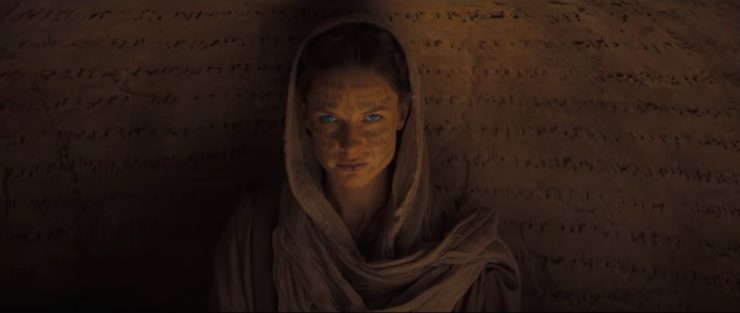
I say again, mistrust of women is part of the reason House Atreides falls, and this arc is almost entirely deleted from the film. Not really sure how that helps the story to center on women? And more importantly, it makes their fall seem incidental, as though Duke Leto is unaware of the trap he’s stepping into. It makes the Atreides seem less canny than they are as a group, which in turn makes it harder to understand how Paul Atreides can become any sort of leader, let alone an effective one. As for Paul’s all-important arc, Timothée Chalamet is great at acting a very specific range and set of emotions, but what he’s missing is the petulant teenager that exists at the beginning of Dune before his “special awful destiny” kicks in; it makes the film hard to understand in places because we’re meant to note a change in him—Duke Leto literally name checks said change to Jessica at one point—that doesn’t exist.
There are many places that might strike a new viewer as odd if they’re less familiar with the story; the focus on the Atreides homeworld of Caladan is one, as is the narrative drag in the second half of the film, and the tendency to have important mantras and speeches first whispered and then repeated. And there’s the repositioning of Liet Kynes (Sharon Duncan-Brewster) as well—a character whose role in the narrative is strangely over-explained at certain points and under-served in others. Ultimately, much of what is presented in this first half is perplexing because it’s unclear what changes to the story are being made. It is possible that as a whole, Dune will read far better, but we can’t know until the second half arrives.
Ultimately, Dune: Part One feels like the story that it is, which is a feat all its own. As eye candy and film tapestry, there is none better. As for the story, we’ll have to see where we wind up once Part Two is delivered to our eyeballs.
Emmet Asher-Perrin is grabbing that soundtrack right the heck now. You can bug them on Twitter, and read more of their work here and elsewhere.










